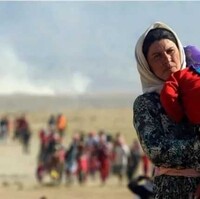Iraq: rapporto di amnesty international elenca 37 civili iracheni uccisi senza ragione dalle truppe inglesi in scontri armati
Amnesty report lists 37 'disputed' killings by UK forces
Hanan Matrud, an eight-year-old girl shot dead by British troops in Basra. She is one of 37 Iraqi civilians killed in disputed circumstances by UK soldiers. Today, an independent report into all these deaths presents new problems for the allies, already reeling from allegations of torture and abuse
By
11 May 2004
Hanan Matrud was playing with three friends when a British Army Warrior armoured vehicle pulled up near her home in a village in southern Iraq. As they ran forward to see what was going on, a shot rang out.
The girl, eight years old, was hit in the stomach with a rifle round. She was taken to the hospital, and had emergency surgery. She died the next day.
There is little dispute that a British soldier was responsible. To her family and neighbours,
it was cold-blooded murder.
The Army says she was probably hit when a warning shot was fired to disperse a stone-throwing mob. An inquiry has proved, the Army says, that the soldiers were not at fault.
Hanan was a "very unfortunate casualty of war". That conclusion is contradicted by a witness, Mizher Yassin, who claims the troops were under no threat.
He says Hanan was standing in an alley about 60 to 70 metres from the armoured car when a soldier aimed and fired a shot.
A report issued today by Amnesty International claims the shooting of Hanan, on 21 August 2003 at Karmat Ali, was one of 37 deaths of civilians in incidents involving British forces. It says those who died posed no apparent threat.
The report claims many of
these cases have not been properly investigated and inquiries launched by the Royal Military Police have been secretive. Kate Allen, Amnesty's UK director, said: "Killings by UK forces, in situations where they should not be using lethal force, are examined in secrecy.
"Instead of the Army deciding whether to investigate itself when civilians are killed, there must be full, impartial and civilian-led investigations."
The report follows a further round yesterday of heated recriminations and accusations of torture, abuse, and killings of Iraqi civilians by US and British forces. Alleged systematic torture by Allied forces contained in two other reports, delivered to the US and British governments months ago, became public for the first time.
One dossier, by the International Committee of the Red Cross, was passed to the American and British governments in February but kept secret by both. The other, an earlier document prepared by Amnesty, was given to the Ministry of Defence in May last year, and discussed with officials from the MoD and the Foreign Office the following month.
The controversy over the handling of the issue by the British Government further intensified with Tony Blair admitting he had no knowledge of the Red Cross report until it appeared in the media.
"I have not seen this document", said Mr Blair. "But let me make it clear to you, my understanding is the two issues raised by the Red Cross document in respect of abuses of Iraqi prisoners; there is one specific case on that issue and those were actually dealt with."
The new disclosures also left a question mark over the conduct of Adam Ingram, the Armed Forces minister, who declared in the Commons last week that he had received "no adverse or other reports".
MPs reacted with incredulity to claims by ministers that they had not been shown the Red Cross report. Geoff Hoon, the Secretary of State for Defence, said the document had been passed to Britain in confidence by Paul Bremer, the US head of the Coalition Provisional Authority, and copies were sent to Sir Jeremy Greenstock, who was the Prime Minister's envoy to Iraq, British military officials in the country, and the military's Permanent Joint Headquarters at Northwood in London. Officials decided the allegations against British forces had already been dealt with, and did not need to be referred to ministers.
The Red Cross report also describes how a 28-year-old man, Baha Mousa, was abused while in British custody and later died. Mr Mousa's family have subsequently received an interim payment of £1,875 from the Government.
The military has also paid out a further £72,000 in compensation to 22 Iraqi families to settle abuse claims.
The Government stepped up its pressure on the Daily Mirror last night when Mr Hoon said the photographs published by the paper allegedly showing an Iraqi prisoner being mistreated by British soldiers looked "increasingly like a hoax". But Mr Hoon was earlier forced to admit in the Commons that British troops had acted illegally in "hooding" prisoners in Iraq last year.
Articoli correlati
 "We are women, we are strong, we say no to the bomb" un mondo di creatività e tenacia
"We are women, we are strong, we say no to the bomb" un mondo di creatività e tenaciaIl movimento femminista e ecopacifista di Greenham Common è ancora vivo
Contro i missili cruise NATO animò una protesta nonviolenta per 19 anni. Il Greenham Common Women’s Peace Camp è al fianco delle proteste ecopacifiste di tutto il mondo, ancora oggi, per proteggere il pianeta dalla distruzione e per portare alla partecipazione politica quante più donne è possibile11 luglio 2024 - Maria Pastore- Il 26 maggio 2004 il New York Times riconobbe i propri errori pubblicando un articolo
Le presunte armi di distruzione di massa di Saddam in Iraq
Giornali come il New York Times, fino al 2003 ostili alla guerra, finirono per accettare come veritiere le affermazioni di Powell e per considerare ineluttabile l'intervento armato. A guerra terminata non fu trovata alcuna traccia di quelle fantomatiche armi.16 novembre 2023  "Breaking News", una volta tanto in positivo
"Breaking News", una volta tanto in positivoIl Regno Unito riconosce i crimini dell'ISIS contro gli Yazidi
Cercare giustizia è necessario per coloro che hanno perso la vita e per le vittime sopravvissute. E la storia merita di essere riconosciuta.2 agosto 2023 - Gulala Salih Un recente studio scientifico ripropone la questione
Un recente studio scientifico ripropone la questioneProblemi di salute mentale dei veterani e militari americani
Dopo due decenni di guerra continua in Afghanistan, una crescente popolazione di veterani si presenta per cure di salute mentale. La depressione rimane una delle principali condizioni di salute mentale nei militari. E ogni anno più di seimila si suicidano.
Sociale.network